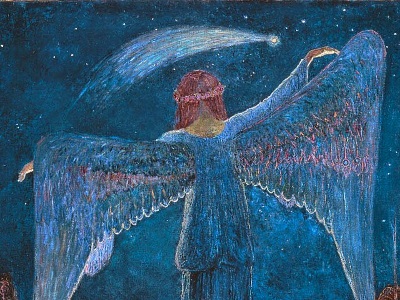Christmas 1932, a little over a month before Hitler would seize power, the small Sannerz community presented The Child of God, a German folk play, in the nearby town of Fulda. Introducing the production, Eberhard Arnold gave this talk based on the words of a German Christmas song, which all of his listeners would have recognized: “Tell why, O God, thou art found here, thou heavenly child, a tiny baby in this world? For love, pure love alone”. Its message stands in stark contrast to the prevailing spirit of that time.
In the course of the centuries people everywhere have possessed a joyful, holy expectation of a time when justice and love will prevail. Often it is only a hidden longing for unity with others. Yet through every century runs the thread of this secret hope for a time when peace and justice will come, when the Eternal One will rule completely. There is no culture on earth that has not carried this hope deep in its heart.
And now this One has come in the insignificance of lowliness, in poverty, an outcast from human society, in the feeding trough of a cowshed. He was executed among criminals by a state most outstanding in its moral and judicial standards, condemned by the demagogic voice of the people. He was killed because people did not want him to live. And again thousands of years have passed, and here and there humankind has felt and received something of the mysterious radiance of his birth.
Today people everywhere are confused, in disarray – enslaved in indescribable spiritual and emotional suffering. Expectation is far removed from fulfillment. Or maybe we haven’t yet found that expectation which, in the midst of the trouble and torment, gives us a ray of hope for the future? A future that does not come from us human beings, a future that shall break in among us.
Let us try to grasp the message of peace and of Christmas, the glad tidings of God’s kingdom. If we look at Jesus, the inconspicuous and lowly one, we begin to understand what expectation and fulfillment truly entail. We begin to grasp that a poor birth in a manger and a humiliating death on a criminal’s cross is the only way expectation can lead to fulfillment.
Are we, too, ready to go the same way? Are we ready to go the way of love? Has this love been born in us and will we live it until death? Do we live for love, pure love alone?
Look back in history: many have gone the way of love. They discovered that the highest joy, the joy of love, leads to the goal. This joy leads to complete poverty, but also to fellowship in all areas of life. More than ever, we need people, young and old, to join together in a practical life of dedicated community founded in complete surrender. This is the way of love, of fellowship, of liberation from all need and suffering. It comes wherever people dare to drop their own fragmented, self-driven lives, their own pretensions, their own works, so as to share together a life of common work and endeavor.
Many will argue that as long as human beings are human, imperfections will result. Granted. But we should never let our longing for what is highest be held back by our imperfections. Herein lies the hope of advent – a time when we look toward the day when all people shall become brothers and sisters because they are all children, sons and daughters of God. For in this one child, so helpless in the crib, a childlike spirit has been revealed on the earth, and this is the answer to life’s deepest and most difficult questions. He alone fulfills our innermost longing.
Adapted from When the Time Was Fulfilled (Walden, NY: Plough, 2007).
Article edited for length and clarity. Read the original in our digital archive: meeting transcript, December 17, 1932.


